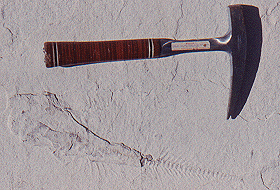 A rock hammer is one of the physical tools used by paleontologists. Eocene fish from Fossil Butte, Wyoming. Photo by author.
A rock hammer is one of the physical tools used by paleontologists. Eocene fish from Fossil Butte, Wyoming. Photo by author.
Physical tools are wonderful things used to acquire empirical data, but they aren't enough if we really want to know what we are looking at. The following is a partial list of logical tools used to sort out all the information that we generate.
Acceptance – of independently confirmed evidence that destroys your hypothesis or theory. It is important to only abandon your claim if it really has been dashed. In other words you have to have a happy medium of open-mindedness and reluctance to abandon an idea. "Your mind is like a parachute—it only works if it is open." But not so open that your brain falls out and flops around on the ground.
Independent Confirmation – of your facts and/or results. It is far too easy for us fallible human beings to trick ourselves into believing what we wish. This is why we require independent confirmation—it keeps us honest.
Falsifiability – your claim must be falsifiable in order to try to prove it false. If you have something that is falsifiable and you cannot prove it false when you sincerely try, then your idea has merit.
Occam's Razor – also known as the principle of parsimony. It states that the simplest explanation is usually the correct one. For example, if you see me holding a book four feet off the ground, you close your eyes, then hear a thud, and open your eyes to see the book sitting on the floor, you are fairly certain as to what just happened. I dropped the book. But you do not have a complete picture of events—you didn’t see me drop it, but you are certain that I did because this is he simplest explanation. You have just used Occam’s Razor.
Peer review – your claim must be tested by other people, especially those who doubt what you have to say. Independent confirmation of your claims, especially by the latter group, puts you on a firm foundation.
Science – this was dealt with near the beginning of this exhibit. Science, in short, is a method that yields reliable information as it uncompromisingly tests claims to establish their validity.